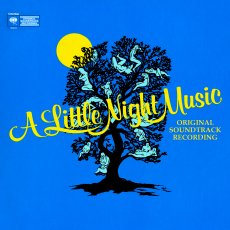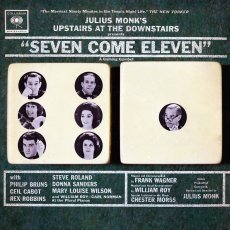Masterworks Broadway is the gift that keeps on giving. There have been so many interesting releases and reissues that it’s been almost dizzying to try and keep up. Their output is consistent and excellent, offering titles as contemporary as Kinky Boots, but also long-unavailable recordings from the Columbia/RCA vaults. The latest batch of releases include the film soundtrack of A Little Night Music and the uber-rare Seven Come Eleven, with the original London cast album of Cowardy Custard (featuring Patricia Routledge) scheduled for release next month.
While the stage version of A Little Night Music is one of the most enchanting musicals ever written, its 1977 film adaptation is a curious misfire. The disappointment of the film is somewhat surprising given that most of the original Broadway production’s creative team worked on the adaptation. Also retained were original cast members Len Cariou, Hermione Gingold and Laurence Guittard. Taking on the lead role of the one and only Desiree Armfeldt is an out-of-her-element Elizabeth Taylor, who is much easier to watch when her character isn’t singing. The most notable and worthy addition to the film cast was the brilliant Diana Rigg, who is excellent as Charlotte.
While it isn’t the worst adaptation of a stage musical ever put to film, it certainly ranks near the bottom of the list. The setting was moved from Sweden to Austria, with several characters receiving new names. Several songs, including “Liaisons,” “In Praise of Women,” and “The Miller’s Son” were cut. There was no quintet, and all their pieces were dropped. Harold Prince, a titanic producer and director for the stage, didn’t fare as well in the movies, with Night Music his second and last film to date.
However, the soundtrack makes for an interesting listen, if only to hear how Sondheim adapted himself for the screen. He turned “The Glamorous Life” into a staggering solo for Desiree’s daughter, Fredrika. This soliloquy has become a favorite of Sondheim interpreters, most notably Audra McDonald, who included it on her recent solo album. Another notable change is the evolution of the sublime instrumental “Night Waltz” into the song “Love Takes Time,” performed by the main characters during the opening of the film. “Now/Later/Soon” has been abridged and is instead “Now/Soon/Later,” while there are new lyrics for “A Weekend in the Country,” which gives the woefully underused Gingold an opportunity to sing a few bars. (For what it’s worth, Jonathan Tunick won the Oscar for Best Score: Adaptation for his contributions).
This new release doesn’t supplant the sublime original Broadway or worthy original London cast recordings by any means, but is more worthy of your time than the leaden 2009 revival recording. Bonus tracks include the previously unreleased extended version of “Every Day a Little Death” used in the film, “Night Waltz,” and the end credits.
I hope this means that the film soundtrack for 1776 is not far behind, essential as the only recording of Howard Da Silva’s performance as Ben Franklin, as well as the opportunity for Virginia Vestoff’s “Compliments” (one of the great moments in musical theatre) to be made available.
Seven Come Eleven was the 1961 installment of Julius Monk’s popular Upstairs at the Downstairs nightclub series. Monk’s cabaret revues were the epitome of New York sophistication, with topical yet gentle satires of pop culture and current events performed in an elegant environment by elegantly attired performers. There are numbers dedicated to First Lady Jackie Kennedy, the John Birch Society, and the Peace Corps, among others. Steve Roland scores with the Gilbert and Sullivan patter parody “Captain of the Pinafores.” Best of all is young Mary Louise Wilson, unbelievably funny in her major solo “Forbidden Tropics,” about scandalous literature, as well as her sketch “Don’t You Feel Naked Not Drinking?” opposite Rex Robbins. It makes for a pleasant listen filled with witty lyrics and playful music, but the album is definitely a capsule of a bygone era.


